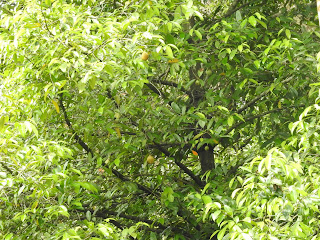Nutmeg is the seed or ground spice of several species of the genus Myristica.
it is cultivated for two spices derived from its fruit: nutmeg and mace. It is also a commercial source of an essential oil and nutmeg butter.
Mace is the spice made from the reddish seed covering (aril) of the nutmeg seed. Its flavour is similar to nutmeg but more delicate; it is used to flavour baked goods, meat, fish, vegetables and in preserving and pickling.
In the processing of mace, the crimson-colored aril is removed from the nutmeg seed that it envelops and is flattened out and dried for 10 to 14 days. Its color changes to pale yellow, orange, or tan.

The tree is native to the Moluccas, or Spice Islands, of Indonesia and is principally cultivated there and in the West Indies.
The fleshy arils surrounding the nutmeg seed are the source of the spice mace
The nutmegs sold whole were dipped in lime to prevent their sprouting.
Nutmeg trees may reach a height of about 20 metres (65 feet).
They yield fruit eight years after sowing, reach their prime in 25 years, and bear fruit for 60 years or longer.
When fully mature it splits in two, exposing a crimson-coloured aril, the mace, surrounding a single shiny brown seed, the nutmeg.
The pulp of the fruit is eaten locally.
After collection the aril-enveloped nutmegs are conveyed to curing areas where the mace is removed, flattened out, and dried.
The nutmegs are dried gradually in the sun and turned twice daily over a period of six to eight weeks. During this time the nutmeg shrinks away from its hard seed coat until the kernels rattle in their shells when shaken.
The shell is then broken with a wooden truncheon and the nutmegs are picked out.
Dried nutmegs are grayish brown ovals with furrowed surfaces

Nutmeg and mace contain 7 to 14 percent essential oil, the principal components of which are pinene, camphene, and dipentene.
Nutmeg on expression yields about 24 to 30 percent fixed oil called nutmeg butter, or oil of mace, the principal component of which is trimyristin.
The oils are used as condiments and carminatives and to scent soaps and perfumes.
An ointment of nutmeg butter has been used as a counterirritant and in treatment of rheumatism.
When consumed in large amounts, nutmeg has psychoactive effects and is reported to be a deliriant and hallucinogen
Nutmeg poisoning is rarely fatal but can cause convulsions, palpitations, and pain.
>>----THANKS FOR VISITING MY BLOG...KEEP IN TOUCH------>







No comments:
Post a Comment